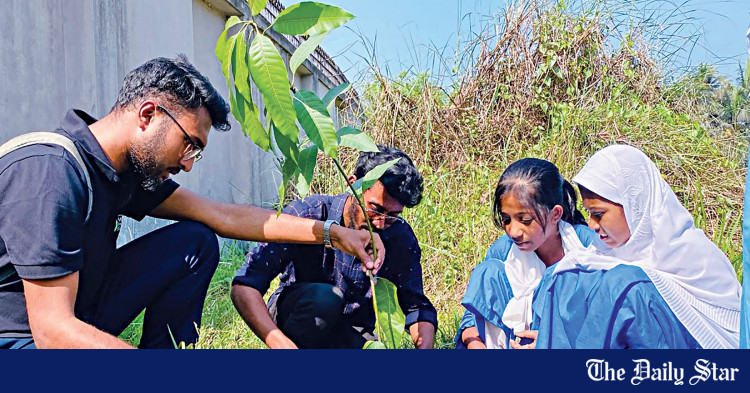BRAC YOUTH PLATFORM
The BRAC Youth Initiative is not only guiding the young activists but also providing training to over a hundred youths who are making impactful contributions in their communities.
Initially, participants receive training on various critical issues such as gender equality, climate change, women empowerment, and waste management.
Shariful Hasan, associate director of BRAC, said, “Through our platform, we aim to demonstrate that our youth possess the capability to tackle community problems. They engage with pressing global issues such as climate change, environmental pollution, gender equality, and women’s empowerment.”
“We first provide them with training and then encourage them to return to their communities to address local issues. They develop their own projects that create a positive impact. Many of these initiatives focus on training women and conducting awareness campaigns on various health issues,” he added.
Shariful added, “Some participants are focusing on climate change, while others are addressing menstrual hygiene. We plan to engage more youth in these activities and aim to connect with additional universities and colleges to create a larger and more impactful change in our society.”
Youths collecting waste from a house in Barishal.
“>
Youths collecting waste from a house in Barishal.
MORE INNOVATIVE INITIATIVES
Inspired by these youth-led initiatives, more young people across the country are developing innovative ideas. One notable example is “Shubhrota”, a platform based in Bogura that focuses on waste management and aims to produce eco-friendly products such as pens, jute bags, and fertilisers.
Another platform making strides in waste management and climate change is “Greentie”, which is dedicated to addressing these critical issues and promoting sustainable practices in the community.
Meanwhile, in Barishal, six students launched their “Waste to Resource” initiative in April 2023, aiming to keep the Kirtankhola River free from pollution.
Md Nazmus Sakib, Md Alamin, Abdul Hasib Molla, Sumyia Alin, Anindo Basak, and Md Hasan Shahrier recognised the detrimental impact of waste on the river and took it upon themselves to take action against the issue.
Youths conducting an interactive session on climate education at a school in Khulna.
“>
Youths conducting an interactive session on climate education at a school in Khulna.
The students initiated a project to collect, separate, and convert organic waste into fertilisers. Locals have noted a significant increase in community awareness regarding the negative impacts of pollution.
Bithi Akter, a local, said, “Now we have become more aware of the bad effects of pollution. We also give our waste to the plants instead of throwing it away recklessly.”
Abdul Hasib Molla, one of the co-founders of the initiative, said, “When we visit the area, we learn about the challenges faced by the community due to river pollution. Many residents are unaware of the dangers it poses. To raise awareness, we started this initiative. We are determined that no waste should end up in the river, and we’ll work tirelessly toward that goal.”
Initially, the team began by collecting waste from 10 households in the slum area, focusing primarily on kitchen organic waste. They established a small facility to store the collected waste until it decomposed and transformed into fertiliser.
In these facilities, the youth allow the waste to decompose for approximately two and a half months, during which it transforms into nutrient-rich fertiliser.
Additionally, the platform has trained over 100 individuals in effective waste management techniques and established a systematic waste collection process in the community.
Md Alamin, another co-founder of the initiative, shared that they have also begun selling fertiliser to residents with rooftop gardens. “We plan to expand our efforts by collecting waste from all households in the slum area, and by 2027, we aim to establish 30 such plants of our own,” he added.
Members of Towards Sustainability promoting climate action on a school campus in Khulna.
“>
Members of Towards Sustainability promoting climate action on a school campus in Khulna.
LOOKING AFTER NATURE
Many students across the country are also working to create a more environmentally friendly future.
For instance, Nushrath Jahan Juhi, a master’s student from Khulna University, established a platform called “Towards Sustainability”, which focuses on distributing trees to community members.
Her initiative has not only made a significant impact in Khulna but has also extended its reach to Mymensingh, Rangpur and Chattogram, promoting reforestation.
Recently, through her platform, they planted 100 neem trees along Islamnagar Road in the Gollamari area of Khulna. Additionally, they distributed various vegetable seeds to promote food security and climate resilience, all under the inspiring motto “Sow, Grow, Expansion”.
“Volunteering has been a part of my life from an early age, and it’s my passion. When I moved to Khulna in 2019, I witnessed the devastating effects of natural disasters and climate change year after year. These experiences made me realise the urgency of the climate crisis,” said Nushrath.
“Towards Sustainability is my way of giving back to my country. Neem trees not only contribute to a healthier environment but also offer countless medicinal and ecological benefits to the community. By planting these trees, we are combating climate change and fostering a sense of responsibility and connection to our environment,” she added.
These youth-led initiatives demonstrate a growing commitment among young people across Bangladesh to combat climate change and promote sustainable practices, ensuring a healthier planet for future generations.










